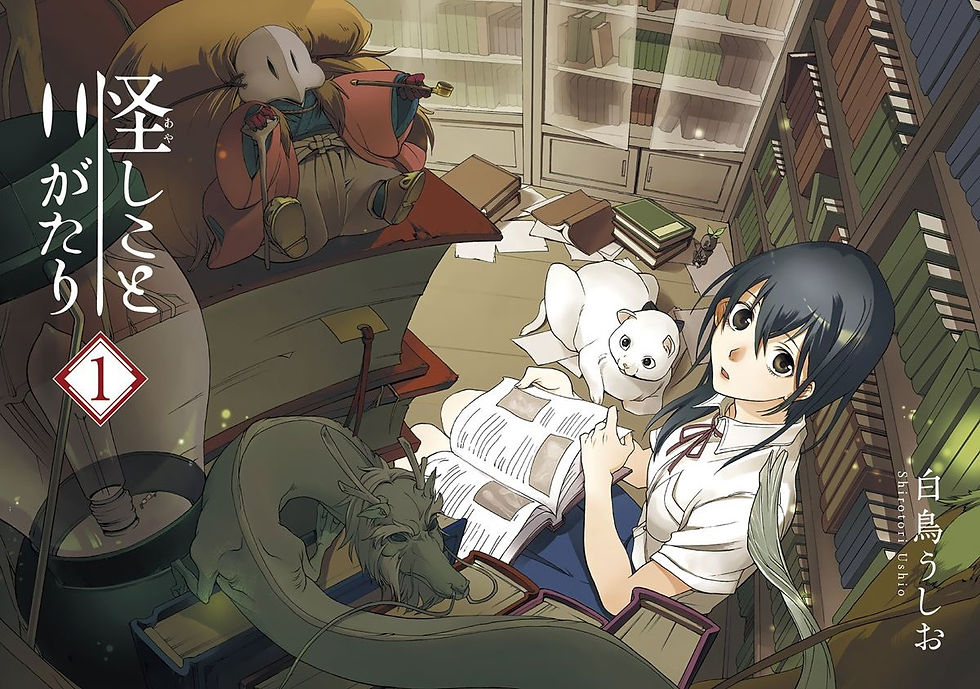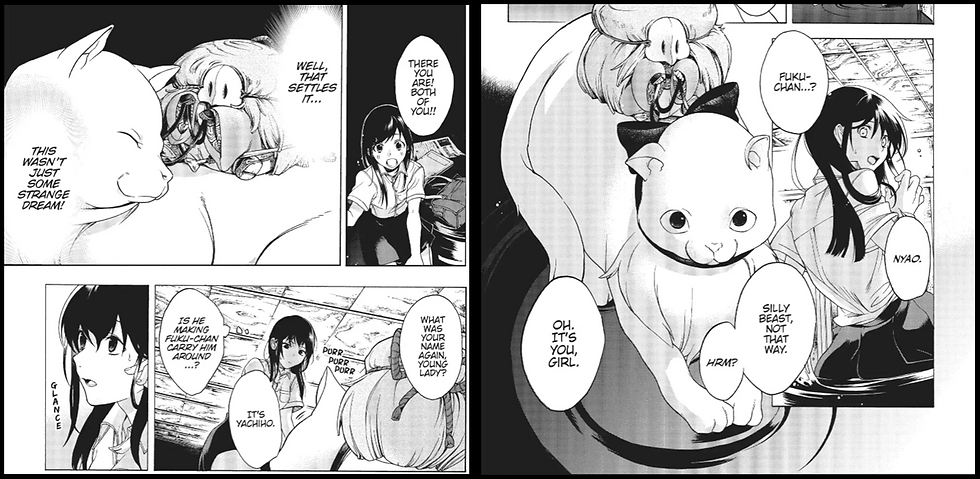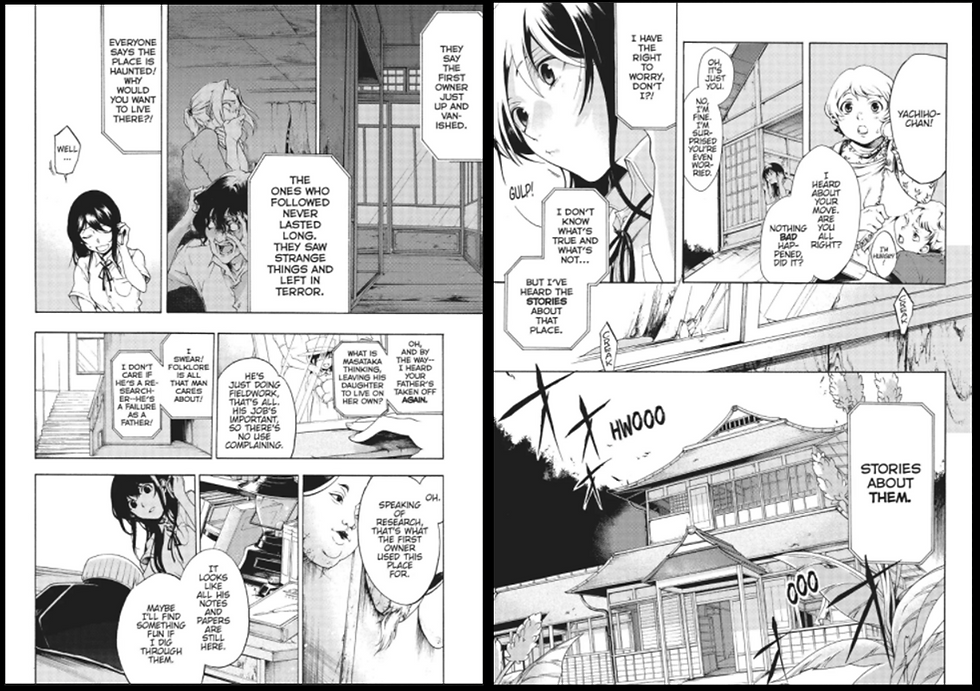Shelf Life: Ghostly Things (Vol. 1)
- Joseph Lutholtz
- Aug 22, 2020
- 7 min read

Alternative Names: Ayashikotogatari
Scores: 4/10, 3/5
Genre: Drama, Comedy, Slice of Life, Supernatural
Publisher: Mag Garden and Seven Seas Entertainment
If you're at all familiar with the spiritualist or onmyoji brand of supernatural stories, Ghostly Things is going to be the same song and dance you're used to with very little in the way of originality or stylistic flair. Written by Shirotori Ushio, published by Mag Garden, licensed by Seven Seas Entertainment, and translated by Nova Skipper, Ghostly Things' story could be described as a female take on The Morose Mononokean but with a chibi spirit creature as the mentor character and a mildly encouraging sack of potatoes as the lead character.

Yaw, Mashmallow! Mush, you adorably creepy-looking cat.
The story of Ghostly Things with something of an exposition dump in the form of a phone call between Takahara Yachiho and an unnamed female character who, in her own words, has "the right to worry" while Yachiho busies herself with cleaning up the dilapidated house she just moved into. During this call, we learn a few key pieces of information regarding who Yachiho is and this new house she's living in. Namely, Yachiho has moved into a notoriously haunted house at the request of her folklorist father in the hopes that they might find a clue regarding the mysterious disappearance of her mother five years ago. Renowned for its original owner mysteriously vanishing, presumably the same way Yachiho's mother did, and for driving every previous tenant away with complaints of strange noises, visions, and various household items being upended during the night. Having spent at least a couple nights in the house, Yachiho has already dealt with two of these problems, leaving her with little doubt that the place is, in fact, haunted.

I think the assumption is that this unnamed woman is supposed to be her old, nosy neighbor? Even if that isn't the case,
Yachiho's "Oh, it's just you" doesn't give me any confidence that this character even remotely matters.
As Yachiho spends the day cleaning and exploring her new home, she eventually uncovers a secret basement--with the help of her supernaturally sensitive cat Fuku--that houses the original owner's various notes and sketches on the ghosts and spirits that inhabit the house. Emboldened by this discovery, Yachiho sets about looking for "The Book of the Dead," the very book her father sent her to this house to find. During her search, though, something else catches her eye. Initially believing it to be a snake, Yachiho lifts up some scattered books to uncover a small dragon.

Not the sharpest tool in the shed, is she?
Either annoyed at having its home invaded or perhaps wanting to show Yachiho something--it's so hard to tell with tiny, wizened dragons--the dragon flies off, leaving the human-shaped goldfish named Yachiho no choice but to follow it. This mini-adventure through the understory of her new home unsurprisingly brings her to "the crossroads between the human and spirit worlds" and its guardian, the diminutive Moro.

Really? After seeing a bunch of different spirits and a giant demon baby
the thing you're most concerned about is a tiny, talking doll?
Following a brief bit of drama involving Moro "sending the dragon home" and Yachiho nearly getting pulled into the spirit world herself by some unknown entity, Moro decides to take her on as his apprentice and mediator between the humans and spirits living in the mortal realm. From here, the rest of the book more or less proceeds the way you'd expect. Each chapter, from here on out, mainly contents itself with being a monster of week series where Yachiro stumbles and smiles her way into solving the problems of various spirits.

Yeah, "personal cheerleader," that about sums up her take on helping the local spirits.
Therein lies the main issue I have with this book. As inoffensive as Yachiho might be as a character, she actually comes across as being absolutely useless. Every problem that comes up ends up getting solved despite her, rather than because of something she did or didn't do. Sure, she acts nice and is kind to all the spirits she meets, once she's stopped being pants-shittingly terrified of them, but most of the legwork is either done by Moro or was an inevitable outcome anyway. The closest we ever get to Yachiho showing any backbone or agency comes when she tells another character who can see spirits to stop being mean to them. Yet, when faced by this weakest of arguments, this supposed villain of the series just acquiesces to Yachiho's toothless demand, gives up on whatever he had planned, and leaves until it's time for him to act evil again.

Aw yeah, nothing says "big evil" like stepping on helpless creatures 1/30th your size.
My complaints with the characters aside, though, nothing else about this book or its story really worked for me. While the references to the original owner of the house and his role as a spiritual medium and the idea of Yachiho inheriting his legacy are interesting enough to keep me interested, I never felt particularly engaged. The main problem is that the series leaves so many things vague that they become inconsequential almost as quickly as they're introduced. The "disappearance" of Yachiho's mother, for example, is supposed to be this grand mystery driving Yachiho to dive headlong into a world she doesn't really belong in. Yet, at no point do we get any details or exposition as to what might have led to her vanishing and how any of it connects to the spirit world or this ominous "Book of the Dead." The only thing we really have to go on are some vague statements made by her folklorist father in a flashback.

"Get in the ghost house, Yachiho." -- Mr. Takkhara, Dad of the Year
As if that flimsy explanation wasn't bad enough, though, even Yachiho herself can't seem to be bothered to stay on task. The degree to which she cares about her missing mother seems to hinge entirely on whether or not the plot wants to care or whenever it feels like the audience needs a reminder that this is supposed to be her main character motivation. That's right, finding her Mom is why she's here and what initially drives her to refuse Moro's initial demand that she leave the spirit world alone and accept his later offer to be his assistant. Yet, just as quickly as she gave up her initial search to go chase a tiny, cute dragon, we never really see her actually try to find the book after that first attempt. What's more, she seems to be entirely confused about whether she's supposed to keep her search hidden from Moro.

One minute, it's this big secret she's supposed to work toward behind his back. The next, she just outright tells him because he asked.

This issue with consistency might be my weakest issue with the story as a whole but it steadily proves to be a nit that I just can't help picking. Quite often, the story feels like it was meant to be released on a chapter-by-chapter basis but that was never the case here. Reminders about who these characters are and what their motivations are, when they exist at all, are brought up on the regular and a lot of details just don't end up meshing from one chapter to the next. The example with Yachiho's mother is, by far, the most egregious example but this problem can also be seen in the space between the reader picking up the book and reading the first chapter. The next best example would be how the dragon Yachiho meets in the first chapter is given two different names. On the book's back cover it is referred to as a "koryu" or "little dragon," which is fitting given its size. In the actual chapter, though, Moro refers to it as a "rairyu" or "thunder dragon." While this might be easily be explained away with a comment about how one might be a subspecies of another or something along those lines, no explanation for this difference is ever given, leaving the reader to either assume it was a mistake or an outright mistranslation.

Of course, another possibility is that the "koryu" seen on the back could simply be referring to one of the other dragons that pop up from time to time. But, again,
since no explanation or introduction is given for any of the spirits that live in the house until they become a problem, there's no way to know for sure.
This overall lack of clarification on anything that happens in of this book leads me to my last gripe--the general sloppiness of the transitions and movement of the story's panels. To be fair, this is the author's debut series and thus some leeway should be allowed for such issues. Yet, at the same time, I feel like this should be pointed out since its one of those problems you don't really notice unless it's especially bad. One such example comes from the panel above with the dragon bumping into Yachiho, tipping her visitor off to the fact that she can see and interact with spirits. This scene is poorly framed, though, because there's no preamble to this happening. There's no shot of the dragon until it's right on her head, making the scene as a whole confusing to read. One of the worst, though, comes in the series first chapter when Yachiho gets dragged underwater by some unknown entity and toward the spirit world.

While unlike the dragon in that we at least get some subtle visual preamble to Yachiho getting dragged under, the scene itself is such a mess that it's difficult to tell what is happening. We can see little shots of some hair-like substance wrapping itself around Yachiho but there's no indication of where the strands come from, what is dragging her down, or why it's doing so. Then, just as quickly as the strands become a threat, they are dealt with as the dragon somehow rips the hair off of Yachiho as it flies past her. Then, as if the scene weren't chaotic enough, the poor storytelling with the panels is compounded with generally poor character writing as Moro proceeds to scold Yachiho for getting dragged under, as if it was her fault she got attacked.

Little dragon here is the real MVP, even if the panel's sense of scale makes his size really unclear.
Now, again, to be totally fair, this isn't a bad story for an author's debut. Its characters and story are inconsistent and a bit flat at times but I can't say I disliked reading it. Like I said at the start, Ghostly Things is just another boilerplate copy of your basic spiritualist story. The only thing that actually annoyed me was how poorly Yachiho was written and treated despite being the main character. It often felt at times that she was relegated to being less of a character with little to no agency simply because she's a girl, an unfortunately common trope in anime and manga. To their credit, though, Shirotori's character designs are honestly quite good and something I'd love to see more of in another author's story. So, on the whole, I feel like it's safe to say that this three-volume series is one you can probably sleep on. If you're like me and just want to try something new, though, I can also say that this series is at least a halfway decent read.


Comments